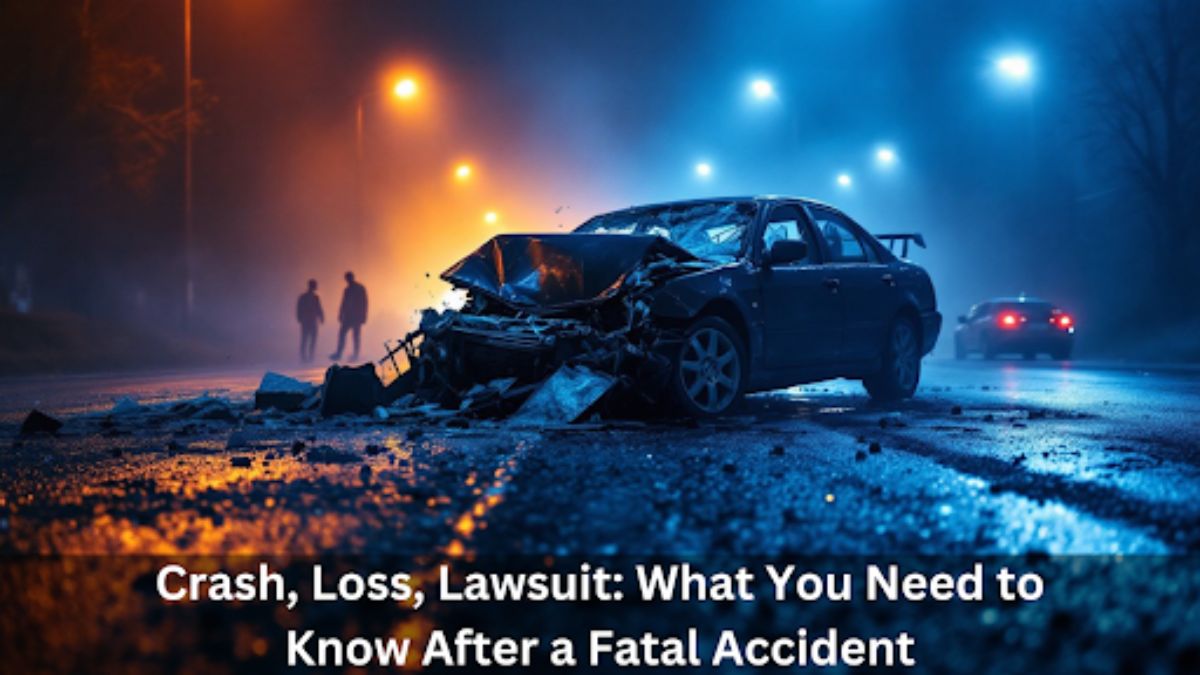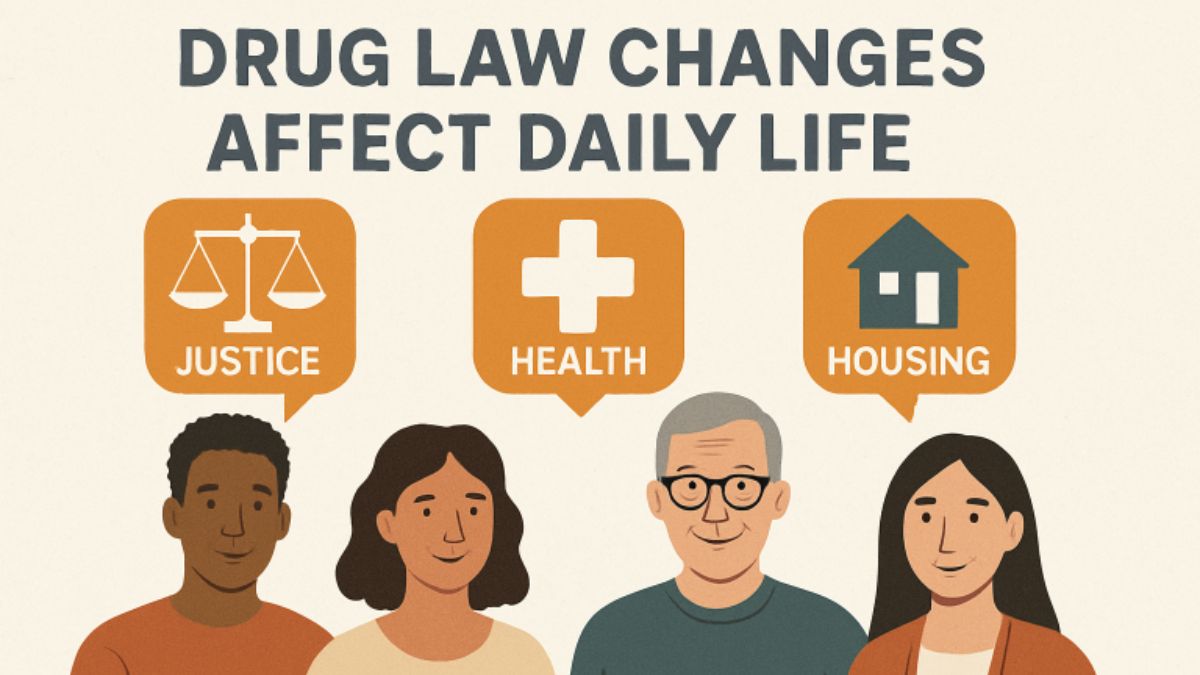LAW
Crash, Loss, Lawsuit: What You Need to Know After a Fatal Accident

What should you do if a loved one is lost in a tragic car accident caused by someone else’s negligence? Along with the overwhelming grief, families often face financial hardships, legal complexities, and difficult negotiations with insurance companies.
In such cases, survivors may have the right to file a fatal car accident lawsuit to seek compensation for medical expenses, funeral costs, and lost income. Knowing the right steps to take, how to handle insurance companies, and when to consult a personal injury attorney in Columbia, SC, is crucial. This blog outlines the legal process and key actions to secure justice.
Immediate Actions to Take After a Fatal Accident
A fatal accident can be chaotic and overwhelming, but taking the right steps at the scene is essential. Ensuring safety, obtaining a police report, and gathering evidence will be critical for legal claims and insurance negotiations.
Ensure Safety and Call Emergency Services
Immediately call 911 to report the accident. Emergency responders will provide medical assistance, and law enforcement will document the crash. Even if the accident is fatal, medical personnel must confirm the victim’s condition, and the police will take over the investigation. Do not leave the scene until law enforcement allows it, as doing so could result in legal consequences.
Obtain a Police Report
Once the police arrive, they will file an official report documenting the accident. This report includes crucial details such as what happened, who was involved, and whether any laws were violated. Since a fatal car accident lawsuit relies heavily on official records, obtaining this report is essential. Officers will also interview witnesses and determine if negligence, such as speeding or drunk driving, contributed to the accident. Request a copy as soon as it becomes available to strengthen your case.
Gather Evidence (If Possible)
If it is safe to do so, collect as much evidence as possible at the accident scene. Take photos and videos of vehicle damage, road conditions, skid marks, and visible injuries. If there are witnesses, get their names and contact information, as their testimonies could help establish liability. Additionally, check for surveillance or dashcam footage, as nearby security cameras may have captured the crash.
Who Can File a Wrongful Death Lawsuit?
Not everyone is legally allowed to file a wrongful death lawsuit. In South Carolina, the law designates specific family members or representatives who can pursue compensation on behalf of the deceased.
Eligible Family Members
The spouse and children of the deceased have the primary right to file a claim. If the deceased had no spouse or children, the parents may be eligible to sue. In cases where no immediate family members exist, a court-appointed estate representative can initiate the lawsuit on behalf of the deceased’s beneficiaries.
Statute of Limitations
In South Carolina, it is necessary to file a wrongful death case within three years after death. Failure to do so will deprive one of the right to seek compensation for a fatal accident. An early action will go a long way towards ensuring that all requirements of the law have been met, thus the need to consult a personal injury attorney in Myrtle Beach or Columbia.
Understanding Liability in Fatal Accidents
Proving liability is essential in a wrongful death lawsuit. The claimant must establish that another party’s negligence directly led to the fatal accident.
Key Factors in Determining Negligence
To prove negligence, the following must be demonstrated:
- Duty of care – The at-fault party had a responsibility to drive safely.
- Breach of duty – They violated this responsibility (e.g., reckless or distracted driving).
- Causation – Their actions directly led to the accident and resulting death.
Common Causes of Fatal Car Accidents
Many wrongful death cases result from driver negligence or hazardous conditions. Some of the most common causes include:
- Speeding – Increased impact force and reduced reaction time.
- Drunk Driving – Impaired judgment and slower reflexes.
- Distracted Driving – Texting, eating, or using a phone while driving.
- Truck Accidents – Large commercial vehicles pose significant risks in collisions. If a truck accident is involved, a truck accident attorney in Columbia can provide legal assistance.
- Poor Road Conditions – Hazards like potholes or inadequate road signs may contribute to accidents.
Potential Compensation for a Fatal Car Accident
A wrongful death lawsuit can help families recover financial losses and compensation for emotional suffering. The damages awarded generally fall into three categories:
Economic Damages
Economic damages cover financial losses that result from the accident and ensure the family is not burdened by unforeseen costs. They include medical expenses accrued towards emergency care immediately following an accident, funeral and burial expenses, and compensation for lost income and benefits. This type of compensation helps secure financial stability after the loss of a loved one.
Non-Economic Damages
The emotional and psychological effects that arise from the death of a loved one are referred to as non-economic damages. This kind of damage recognizes that the bereaved family members are entitled to compensation for pain and suffering, representing their emotional pain and trauma. Additionally, loss of companionship damages recognize the absence of love, support, and guidance from the deceased.
Punitive Damages
However, when a certain guilty party is considered to have been grossly negligent (like drinking and driving, for example), courts award punitive damages. They are instituted to punish and deter future misconduct.
How to Deal with Insurance Companies After a Fatal Crash
Insurance companies try to bring down their claim payouts to save a lot for themselves. Knowing how to be at par during an insurance negotiation can assure one of the great and just reimbursement.
Avoid These Mistakes When Speaking to Insurance Companies
However risky accepting the initial settlement payout; first offers are generally less and may not compensate for all losses. Giving a recorded statement may be harmful since insurers may keep the words against you to lower a payout. Signing documents without legal advice is another pitfall, as you might unknowingly waive your right to further compensation.
Steps to Maximize Your Claim
Hiring a personal injury lawyer in Myrtle Beach or Columbia can help protect your rights and help you through the complexities of insurance negotiations. Keeping thorough records is critical, both medical and financial, to document every loss suffered and to support the claim. Request to have an exhaustive breakdown of full insurance coverage so that you can have the coverage limits in mind before accepting any settlement.
When to Hire a Lawyer for a Fatal Accident Case
The litigation processes in wrongful death lawsuits may be a nightmare to a frightening affair if the parties concerned do not have any legal assistance. The Myrtle Beach personal injury lawyers or Columbia truck accident attorneys can help families throughout the entire process regarding settlements and fair compensation procedures. The best time to contact an attorney is immediately after the accident, as they can begin gathering evidence and building the case.
FAQs
How long do most car accident settlements take?
Most car accident settlements take several months to over a year, depending on case complexity, liability disputes, medical treatments, and negotiations with insurance companies or legal proceedings.
How much compensation for anxiety after a car accident?
Compensation depends on factors that include severity, medical treatment, and the effects on daily life. In general, cases of long-term emotional distress or PTSD tend to bring higher settlements.
How long will PTSD last after a car accident?
PTSD duration varies. Some recover in months with therapy, while severe cases can persist for years. Early treatment improves outcomes, but some individuals may experience lifelong symptoms.
Protect Your Rights After a Fatal Car Accident
Losing a loved one in a fatal accident is a tragedy, but understanding your legal options can provide financial relief and justice. Acting promptly, gathering evidence, and consulting an experienced injury lawyer in Myrtle Beach can help protect your rights. If your family has been affected by a wrongful death accident, reaching out to a trusted attorney can make all the difference in securing the compensation you deserve.
LAW
How Changing Drug Laws Affects Everyday People

Across the United States, drug laws are rapidly evolving. These shifts reach far beyond courtrooms and legislatures, touching the lives of individuals, families, and entire communities. Understanding the ongoing changes is crucial, as they shape how people interact with law enforcement and affect critical areas of daily life, including employment, housing, and public health. For those facing potential penalties or navigating legal uncertainty, obtaining local guidance on a drug possession charge Northwest Louisiana can be a vital first step towards understanding and protecting your rights.
People living under new drug policies must stay alert to changing laws so they can adapt and make informed decisions. These legal adjustments signal a broader shift in the national perspective, treating substance use less as a criminal act and more as a public health concern. The effects of these shifts are becoming more visible in day-to-day life, making it essential for everyone to stay informed.
Historical Context of Drug Legislation
Tough drug policies have shaped America’s prison population and criminal justice priorities for decades. The Anti-Drug Abuse Act of 1986 is a key example, imposing mandatory minimum sentences that led to a dramatic increase in the number of incarcerated individuals, especially among Black and minority communities. These policies created deep generational impacts, including broken families and persistent barriers to economic advancement. As criminal justice reform advocates highlight, the long-term consequences of these laws still resonate in communities today.
Over time, research, advocacy, and lived experience have revealed the flaws in “tough on crime” approaches, particularly in their disproportionate targeting of minority populations. These insights have led to calls for reform and a reevaluation of the intent behind drug enforcement.
Recent Legislative Changes
Modern drug law reforms reflect an emerging consensus that existing policies failed to address the root causes of addiction or reduce crime. Notably, the U.S. Drug Enforcement Administration (DEA) recently proposed moving marijuana from a Schedule I to a Schedule III drug. This change acknowledges the substance’s medical uses and signals a loosening of previous restrictions. Legislative shifts like these pave the way for expanding research, reducing legal penalties, and opening new avenues for medical treatment, while also reducing government spending on enforcement and incarceration.
Several states now embrace not only marijuana decriminalization but also broader harm-reduction strategies. Local initiatives experiment with diverting drug offenses from the criminal system to treatment-based alternatives, aiming to address addiction without relying solely on punitive measures.
Impact on Employment and Housing
Drug convictions can create lifelong barriers to stable employment and housing. Many employers and landlords continue to use criminal background checks, limiting opportunities for those with drug offenses on their records. Reforms that reduce penalties or allow for expungement can dramatically change life prospects, enabling individuals to rebuild their careers and secure stable living environments without the persistent shadow of their past.
This shift is significant for communities attempting to break cycles of poverty and incarceration. With more states adopting policies that provide for sealing or clearing certain drug charges, people who were once removed from economic participation now have better chances to reintegrate.
Community Dynamics and Public Health
When drug policies focus on treatment and support rather than incarceration, communities can see notable improvements in public safety and health. For example, some cities are investing in diversion programs where individuals facing minor drug charges are guided towards addiction treatment and recovery resources, sometimes instead of jail. This approach aims to lower both overall crime rates and the strain on emergency services, while fostering healthier community environments.
Cities such as Seattle provide real-world examples where shifting the response from criminalization to support leads to positive public health outcomes. It also improves opportunities for rehabilitation and decreases the social isolation experienced by those struggling with addiction.
Racial Disparities and Social Justice
Drug law reform is inextricably linked to efforts to confront racial injustice. Historical enforcement patterns have disproportionately targeted Black and Latino communities, resulting in higher rates of arrest and incarceration for nonviolent drug offenses. The negative effects extend far beyond the criminal justice system, affecting economic opportunity, voting access, and overall community stability.
Updating drug policies can help correct systemic imbalances by reducing convictions for nonviolent offenses and promoting a greater focus on prevention, education, and community-based support. Reducing disparities in enforcement and sentencing is essential to restoring trust and achieving true social justice.
Staying Informed and Engaged
Drug policies continue to change at the federal, state, and local levels. Individuals and families must track these changes closely and seek reputable guidance when needed. Local organizations, legal clinics, and advocacy groups can provide crucial support and resources to help people navigate new regulations and assert their rights effectively. Seeking guidance from professionals with experience in your specific region can help avoid pitfalls and take advantage of available relief measures.
Conclusion
The evolution of drug laws marks a significant cultural and legal shift from punitive models to approaches centered on health, fairness, and empowering communities. These changes affect every aspect of public and private life—from job prospects to civil rights—making it essential for Americans to stay engaged and informed as the landscape continues to evolve.
LAW
Family Law Basics: Key Issues and Solutions

Family law touches nearly every aspect of our most personal relationships, including marriage, separation, child custody, and financial arrangements after a separation. Understanding the foundations of family law can make navigating these highly emotional and complex issues less overwhelming and far more manageable. Many individuals facing family legal challenges turn to a family attorney Tampa for experienced legal support and guidance, especially when outcomes can significantly impact their families’ futures.
From creating legal unions to resolving child custody disputes, family law is designed to both protect and provide clarity for all parties involved. Whether you are preparing for marriage, facing divorce, or seeking a protective order, having a clear understanding of your rights and obligations is crucial. This knowledge not only empowers you to make informed decisions but also helps ensure that your family’s well-being remains the top priority in any legal process. With laws and regulations differing from state to state, staying informed and seeking timely legal counsel is often a wise first step.
Marriage and Legal Unions
Getting married is not only a significant emotional milestone, but it also constitutes a legal contract between two individuals. Family law regulates the process of legal unions, setting the requirements for age, consent, and state-specific documentation. Once married, both partners acquire certain legal rights and responsibilities, encompassing joint property rights, financial duties, healthcare decisions, and inheritance arrangements. These legal dimensions make marriage more than a personal promise; it’s a legal status that carries essential consequences.
Understanding the legal prerequisites for marriage, such as blood tests (in some states), license applications, and waiting periods, can be essential for couples planning to wed. Entering marriage with a solid knowledge of these requirements helps lay a strong legal and relational foundation.
Divorce and Legal Separation
Divorce marks the legal end of a marriage and can be a complex process involving emotional, financial, and logistical hurdles. States generally recognize two main approaches: no-fault divorce, which doesn’t require proof of wrongdoing, and fault-based divorce, which requires grounds such as abuse or infidelity. Divorce settlements typically encompass asset division, debt allocation, child custody arrangements, and ongoing support agreements.
Legal separation, an alternative for couples not ready for divorce, allows for the division of property and parental responsibilities while the marriage remains legally intact. This can provide a middle ground for couples grappling with reconciliation or religious reasons for avoiding divorce.
Child Custody and Visitation
When children are involved, custody arrangements become a critical aspect of family law. Courts make custody and visitation decisions with the child’s best interests in mind, considering factors like each parent’s stability, parenting ability, and the wishes of older children. There are several types of custody—legal, physical, joint, or sole—depending on the circumstances.
Visitation rights ensure that both parents can continue to be involved in their child’s life. Modern courts increasingly value maintaining meaningful relationships with both parents unless doing so would endanger the child’s safety or well-being.
Child Support and Alimony
Ensuring children have access to the resources they need is at the heart of child support law. Child support payments are designed to cover basic needs, such as housing, food, and healthcare, and may also include expenses for education and extracurricular activities. The calculation of support obligations typically considers parental income, custody arrangements, and the child’s specific needs.
FindLaw’s guide to child support provides a detailed overview of the process, including calculation methods and enforcement procedures.
Alimony, also known as spousal support, may be awarded when one spouse requires assistance in becoming financially independent after divorce. Courts weigh factors such as the length of marriage, earning potential, and each party’s contributions when determining if and how much alimony is paid.
Property Division
In a divorce, marital property (assets accumulated during the marriage) must be divided. Most states follow the principle of “equitable distribution,” aiming for a fair—though not necessarily equal—split based on the partnership and individual needs. Factors considered may include the duration of the marriage, both spouses’ contributions, and future financial prospects.
Debts incurred during the marriage—like mortgages or loans—are divided alongside assets. Understanding what qualifies as marital vs. separate property can help prevent conflicts during the legal process.
Adoption and Guardianship
Adoption provides a legal framework for individuals to become the lawful parents of a child who isn’t biologically theirs. The process is thorough, including background checks, home studies, and court hearings to ensure the child’s welfare. Adoption can be domestic, international, or through foster care systems.
Guardianship provides an alternative legal arrangement, enabling individuals to care for a child without relinquishing parental rights. It’s often used in cases where parents are unable to care for their child temporarily but wish to maintain their legal relationship.
Domestic Violence and Protective Orders
Protecting family members from harm is a vital function of family law. Victims of domestic violence can seek protective (or restraining) orders, which legally prevent abusers from contacting or approaching the victim. Courts act quickly to ensure safety, sometimes issuing immediate orders before a full hearing has taken place.
Support organizations and the National Domestic Violence Hotline provide essential resources and safety planning for individuals in abusive situations. Legal tools and community resources together play a crucial part in preventing harm and facilitating recovery.
Prenuptial and Postnuptial Agreements
Prenuptial and postnuptial agreements outline how future disputes over property and debts should be resolved in the event of divorce or death. These legally binding documents clarify expectations, prevent misunderstandings, and protect assets such as family businesses, inheritances, or premarital property.
While discussing such agreements can be sensitive, they often help foster transparency and trust by addressing financial matters before potential issues arise.
Family law encompasses a wide range of deeply personal issues, but receiving timely and knowledgeable legal guidance can provide clarity and peace of mind. By educating yourself about your rights and obligations, and considering experienced legal help when necessary, you can ensure that your interests and your family’s well-being are protected throughout every step of the process.
LAW
Defense Attorney Near Me

You may find yourself searching for a defense attorney near me during times of stress or uncertainty. When facing legal challenges, having the right defense attorney by your side is crucial. They stand as your guide, offering strong support and clear advice. This decision is not just about location. It’s about choosing someone who listens, understands, and fights for you. A nearby defense attorney often offers more than convenience. They can provide local insight and quick response times. You deserve to feel confident and secure knowing you have a dedicated professional in your corner. You want someone who understands the weight of your situation and is ready to take immediate action. Navigating the legal world can be overwhelming, but with a trusted defense attorney nearby, you are not alone. They will walk with you, ensuring that your rights are protected and your voice is heard.
Understanding the Role of a Defense Attorney
A defense attorney is your legal protector. They represent you in criminal cases, working tirelessly to ensure your side of the story is heard. Their responsibilities include gathering evidence, interviewing witnesses, and crafting a strong legal strategy. This role demands not only legal skills but also empathy and dedication. Your attorney serves as both an advocate and a counselor, guiding you through complex legal processes. According to the United States Courts, understanding your rights and the intricacies of the legal system can significantly impact the outcome of your case. By selecting an attorney who is both skilled and compassionate, you set the stage for the best possible defense. For more detailed information on criminal laws and penalties, visit the Law Office of Michael Stefanos.
Why Local Matters
Choosing a “defense attorney near me” is more than a matter of convenience. Local attorneys bring an understanding of regional laws and court systems, which can be invaluable. They often have established relationships within local legal circles, which can facilitate more effective communication and negotiation. Being nearby allows them to dedicate more time to your case, offering the advantage of immediacy in actions and decisions. Furthermore, their proximity often translates to better availability for meetings and court appearances. This local advantage can be crucial in developing a tailored defense strategy that considers all aspects of your case.
Factors to Consider When Choosing a Defense Attorney
When selecting a defense attorney, consider these key factors:
- Experience: Look for an attorney with a proven track record in similar cases.
- Communication: Ensure they communicate clearly and are available to answer your questions.
- Reputation: Research online reviews and seek recommendations from trusted sources.
Choosing the right attorney can profoundly affect your case’s outcome. For help with finding a lawyer, you might consult resources like the American Bar Association.
Potential Costs Involved
Understanding the potential costs involved in hiring a defense attorney is essential. Legal fees can vary widely based on experience, case complexity, and location. Here’s a simple comparison to help you understand general expectations:
| Service | Average Cost |
|---|---|
| Initial Consultation | Free to $300 |
| Hourly Rate | $150 to $700 |
| Flat Fee for Misdemeanor | $1,000 to $3,000 |
| Flat Fee for Felony | $3,000 to $10,000+ |
Discuss cost structures with potential attorneys upfront. Ask about any additional fees and understand what services are included.
The Importance of Trust
Trust is the foundation of any attorney-client relationship. You should feel comfortable sharing sensitive information with your attorney. If you feel unsure or uneasy, it may be wise to continue your search. An attorney who listens and responds with understanding helps build the trust necessary for a collaborative relationship. This trust will be crucial as you work together to build a defense that aligns with your needs and expectations.
Final Thoughts
Facing legal challenges is never easy. However, with a “defense attorney near me,” you gain a partner who understands the legal landscape and is committed to your defense. Whether you’re navigating a minor issue or a more serious charge, the right attorney provides the guidance and support you need. Take the time to research and choose someone who aligns with your values and needs. Doing so can significantly influence the journey ahead, offering peace of mind and a positive impact on your case’s outcome.
-

 FASHION1 year ago
FASHION1 year agoTop Kids Clothing Trends for 2025 – What’s In Style This Year?
-

 FASHION1 year ago
FASHION1 year agoElegant Winter Party Style: Trendy Long-Sleeve Dresses and Essential Hair Care Tips
-

 HOME1 year ago
HOME1 year agoWeather Related Event Closings Explained
-

 HOME1 year ago
HOME1 year agoExploring the World of TG Tube: A Comprehensive Guide
-

 AUTOMOTIVE1 year ago
AUTOMOTIVE1 year agoMitsubishi Pajero 3.0 V6 – Specs, Performance & Guide
-

 BUSINESS1 year ago
BUSINESS1 year agoHOW TO SHOP GOODWILL OUTLET STORE
-

 HOME1 year ago
HOME1 year agoTributePrintedPics Review: A Deep Dive into Quality, Design, and Customer Experience
-

 EDUCATION12 months ago
EDUCATION12 months agoCan You Wear a Different Coloured Contact Lens in Each Eye? The Science Behind Mismatched Vision
